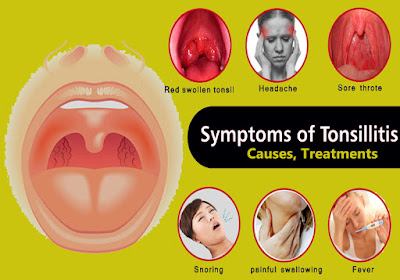Tonsils are the two oval-shaped pads of tissues which are located at the back of the throat, one on each side. When tonsils suffer inflammation, that condition is called tonsillitis. There are several symptoms of tonsils which include swollen tonsils, difficulty in swallowing due soreness in the throat, and tender lymph nodes on the sides of the neck. Most of the cases of tonsillitis are due to bacterial infections or viral infections.
 |
| Talk to Doctor Online |
Various symptoms of tonsils are:
Basically what is generally observed that children of preschool and teenage suffer from this issue. Common symptoms of tonsillitis include the following:
1. Red, swollen tonsils
2. Yellow or white patches or coating on the tonsils
3. Sore throat
4. Difficulty in swallowing
5. High Fever
6. Enlargement of the tender glands on the neck
7. Voice becomes scratchy
8. Foul breath
9. High pain in the stomach
10. Stiffness in neck
11. Headache and even migraine
Among young children, The various signs of tonsillitis may include:
1. They face difficulty in swallowing, that results in drooling.
2.Refusal to eating food
3.Unusual fussiness and giddiness
Some other causes of tonsils are:
Common viruses are the real culprits here and even bacterial infections can also cause the disease. Streptococcus patho genes is a common bacterium resulting in tonsillitis. This is the bacterium that causes strep and sour throat.
Tonsillitis is another form of inflammation in tonsils because of severe infection and is generally caused by several viruses and bacteria. It is clearly quite common in young children but it can occur at any age. If you are suffering from a weak immune system, especially of children, overworked, and elderly people then the tonsils become very vulnerable to you during a constant attack by the viruses and bacteria and get infected.
A most effective and common cause of tonsillitis is viruses. In fact infections are caused by viruses, such as common cold and flu, there is also an EBV virus which is very dangerous (it is a part of the herpes family which generally spreads with the bodily fluids, most commonly through kissing) that causes mononucleosis or mono popularly known as the kissing disease which is a deadly one. Thus we have listed some of the common viruses that cause tonsillitis:
1. Adenoviruses
2. Influenza virus
3. Epstein-Barr virus
4. Parainfluenza viruses
5. Enteroviruses
6. Herpes simplex virus
What do the tonsils get infected?
For the bacteria and viruses that enter our mouth, the system's first line of defense against them are tonsils. This particular function of tonsils makes them vulnerable to inflammation and infection. After puberty, the tonsil’s immune system gradually decreases. This may result in one of the key factors that cause several cases of tonsils in adults and Children.
Several factors that involve risk for tonsillitis include:
1. Young age: Tonsillitis mainly occurs in children of small young age, but rarely happens to children younger than two years. It has been observed that small children between age 5 to 15 years, tonsillitis is mainly caused by bacteria which is quite common, whereas, in children of smaller ages, virally spread tonsillitis is often common.
2. Exposure to germs: School going children usually came in more association with each other. That causes allergies and spread the viruses and germs that may lead to tonsils.
Other complications due to tonsillitis:
Inflammation of the tonsils and swelling of tonsils from any frequent or ongoing tonsillitis can result in the following complications:
1. Difficulty in breathing
2. Disrupted breathing pattern during sleep.
3. Infection that often results in pus behind a tonsil.
Methods to prevent tonsillitis:
The germs that cause bacterial and viral tonsillitis are quite contagious. Thus, the best way of preventing tonsillitis is to practice good hygiene.
1. Wash his or her hands thoroughly after the toilet and before eating.
2. Try to avoid sharing of food, drinking glasses, water bottles, and various utensils to come in contact with viruses.
3. Change your toothbrush every time, after being diagnosed with tonsillitis.
Following are the things one can practice to help your child in preventing the spread of a bacterial or viral infection to others:
1. Always keep your child at home in case of illness.
2. Asking the doctor frequently is recommendable.
3. You must teach your child to cough or sneeze on a tissue.
4. Teaching the child how to wash hands is the need of the hour.
How one can diagnose tonsillitis?
In general, a trained physician will ask the patient for his medical history and only then he will perform any physical examination. He will check the throat to check for swollen tonsils and he will also look at the nose and ears. He listens to the breathing using a stethoscope. In severe cases, the doctor can ask the patient to do a swab. During the swab test, the doctor keeps on rubbing a swab on the back of the patient ’s throat to take a sample of secretions. After this, the sample is sent to the laboratory for further testing. The main idea behind the swab test is to check if the cause of the infection is streptococcal bacteria.
What are the various ways by which one can treat tonsillitis?
Treatment of tonsils always goes with the cause. It is essential to examine the root cause and then provide appropriate treatment. If a bacterial infection is a cause, then antibiotics will be prescribed.
Depending on the tests, viral infections basically do not show up. However, if the results of the bacterial tests are negative, then it can be safely assumed that it is a viral infection. If the viral infection is the cause, antibiotics will not be able to help and your immune system will have to fight the infection on its own. By that time, you can follow some simple home remedies. Bed rest gives maximum relief.










No comments:
Post a Comment